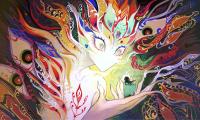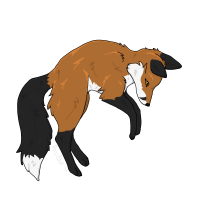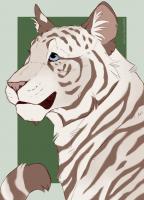| |
| RE: Instinct Triggerer Theory |
|
Posted in: Explanations of Therianthropy Posted by: ouch - 2026-02-03 12:28
|
|
 I really like this theory and how it connects to mental illnesses. At their most fundamental level, mental illnesses are just instincts (either developed during ones life, or developed by their ancestors and passed down) made to help people survive. Obviously they cause harm but the reason they develop at all is in response to trauma and trying to survive that trauma.
I really like this theory and how it connects to mental illnesses. At their most fundamental level, mental illnesses are just instincts (either developed during ones life, or developed by their ancestors and passed down) made to help people survive. Obviously they cause harm but the reason they develop at all is in response to trauma and trying to survive that trauma.
I agree with @Thorn on the range of therianthropic instincts making it unlikely that they would originate from some same instinctual baseline that all humans have. But there is something to be said about therian instincts developing much in the same way mental illnesses do, as a defense mechanism.
No two traumatic events are the same and that is what leads to the range in neurodivergent experiences, I see no reason why the same wouldn't apply to therianthropy.
|
|
| RE: About faunalunes |
|
Posted in: Introduction to Therianthropy Posted by: KeweyTanuki - 2026-01-31 3:35
|
|

(2026-01-30 18:27)Evi Wrote: Not sure how much you have in, but when I was poking around where my little sib interacts with other therians, I found this dictionary. It seems very well-thought out with a whole lot of terms, both genuine and fanalune. It also has sources (lots of tumblr but there’s a few genuine sources, even TG!).
Thanks Evi! There's a therian-specific version here too.
|
|
| RE: About faunalunes |
|
Posted in: Introduction to Therianthropy Posted by: StormyNeedsALife - 2026-01-31 2:20
|
|
 I have seen the word "otherkiv" once or twice its unnecessary (I think) according to one YouTube video (I could not find anything else on it its --
I have seen the word "otherkiv" once or twice its unnecessary (I think) according to one YouTube video (I could not find anything else on it its --
An otherkiv is someone who receives/has non-human experiences, much like a therian. unlike therians however, they do not identify as their would be theriotype, or kivtypes.
I am new to this community but ehhh sort sounds weird. I think this counts faunalune I think. (corrent me if I am wrong)
|
|
| Everything that I know about Therianthropy. |
|
Posted in: Explanations of Therianthropy Posted by: ✰Bleachd_Tiger✰ - 2026-01-30 19:44
|
|
 Therianthropy is a term originally from Greek meaning “wild animal” and “human.” Historically, it referred to mythological shapeshifting (like werewolves), but in modern usage it also refers to a personal identity experience where a person feels, mentally or spiritually, that they identify as a non-human animal.
Therianthropy is a term originally from Greek meaning “wild animal” and “human.” Historically, it referred to mythological shapeshifting (like werewolves), but in modern usage it also refers to a personal identity experience where a person feels, mentally or spiritually, that they identify as a non-human animal.
Therianthropy is not a medically recognized mental disorder as of the time of writing this.
Psychological therianthropy
The identification with an animal may come from neurodivergency, the subconscious, or personal coping mechanisms developed over time.
Some theorize that early experiences (like trauma or unique brain wiring) could contribute to how someone relates to an animal identity.
There are rare clinical conditions (like clinical lycanthropy) where someone literally believes they are an animal, but that’s distinct from how therians describe their experience.
spiritual identity
The connection to an animal might be understood as a spiritual essence that resonates with that animal.
This interpretation is personal and varies. It isn’t tied to a specific religion, and many therians who think spiritually about their identity still practice entirely separate religions or none at all.
Sources
https://en.wikipedia.org/wiki/Therianthropy?
https://thetheriansociety.com/therian-discussion-document
https://alterhumanity.fandom.com/wiki/Psychological_Therianthropy?
https://alterhumanity.fandom.com/wiki/Spiritual_Therianthropy?
My own experience lol
|
|
| RE: About faunalunes |
|
Posted in: Introduction to Therianthropy Posted by: Evi - 2026-01-30 18:27
|
|
 Not sure how much you have in, but when I was poking around where my little sib interacts with other therians, I found this dictionary. It seems very well-thought out with a whole lot of terms, both genuine and fanalune. It also has sources (lots of tumblr but there’s a few genuine sources, even TG!).
Not sure how much you have in, but when I was poking around where my little sib interacts with other therians, I found this dictionary. It seems very well-thought out with a whole lot of terms, both genuine and fanalune. It also has sources (lots of tumblr but there’s a few genuine sources, even TG!).
|
|
| RE: About faunalunes |
|
Posted in: Introduction to Therianthropy Posted by: KeweyTanuki - 2026-01-30 17:10
|
|
 If anyone has any other therian-related words they want me to chop up and put into the faunalune generator, please reply to the thread with the word and its supposed definition. Or even just chunks of word work fine as well. This is meant to be something we can all have a knowing giggle at.
If anyone has any other therian-related words they want me to chop up and put into the faunalune generator, please reply to the thread with the word and its supposed definition. Or even just chunks of word work fine as well. This is meant to be something we can all have a knowing giggle at. 
Or if anyone knows a good place to source more terms which isn't TikTok, that would be great to know too.
Thanks to @Murray for the spiffy faunalune logo also!
|
|
| RE: Furries are from Mars, otherkin are from Venus |
|
Posted in: Explanations of Therianthropy Posted by: Lopori - 2026-01-30 11:23
|
|

(2026-01-29 23:04)TJWolf Wrote: In my last reply to this thread, I detailed how the shift from online forums to social media is what enticed females into these communities but there's another side of the coin.
Aesthetic based social media such as Facebook and Instagram also gives young females bodily dysphoria because they are constantly comparing themselves to whatever image and behavior the internet deems to be the "ideal" woman.
It's no stretch to consider that there's only two main avenues a young female can travel down when she searches "I don't fit the ideal, I feel like I'm in the wrong body".
Aye, I think that's a possible factor too.
|
|
|







![[-]](images/collapse.gif)

